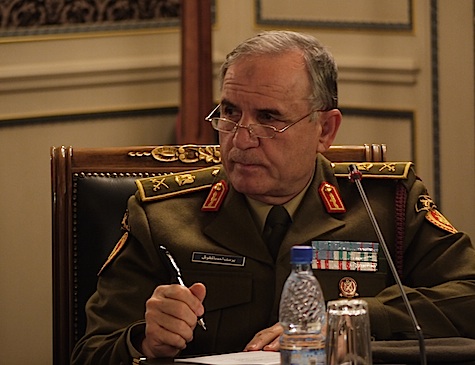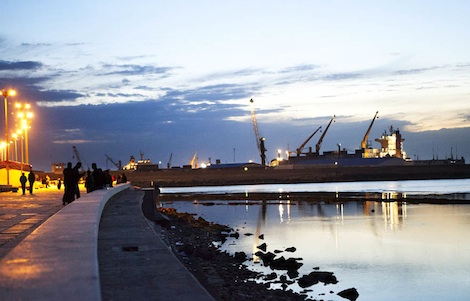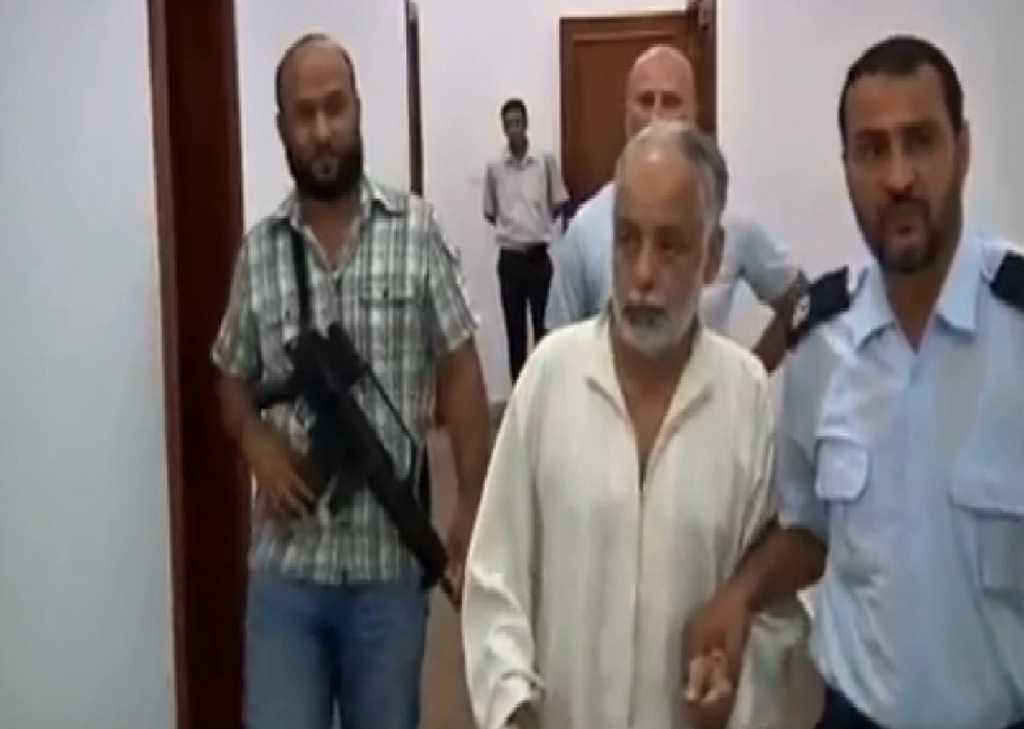http://www.libyaherald.com/2012/12/11/congressmen-move-to-dismiss-mangoush/

Exclusive: Congressmen move to dismiss Mangoush as army chief of staff
By George Grant.

Major General Yousef Mangoush has been head of Libyan ground forces since 2 January 2012. (Photo: George Grant)
Tripoli, 11 December:
A group of Congressmen are working to dismiss Major General Yousef Mangoush as army chief of staff, the Libya Herald has learned.
More than 50 members have privately added their names to a motion calling for an evaluation of the most senior office holders in Libya who were appointed under the unelected NTC and Kib Government, and consequently without democratic oversight.
Mangoush heads the list, which also includes Central Bank Governor Sadek Kabeer and Intelligence chief Salem Al-Hassi, because it is his performance which is said to be the greatest cause for concern.
“We are going to try and discuss changing the important positions in the state”, said Tawfeeq Ebraek Othman, a National Forces Alliance member for the Tobruk, El-Guba and Derna constituency.
“The first person we want to question is Mangoush, because he has done nothing since he took up his position. The most important question is why has he not established a national army until now?”
As Governor of the Central Bank, Kabeer has been criticised for poor priotisation and failing to address Libya’s liquidity crisis, whilst Al-Hassi will surely be scrutinised for failing to develop any meaningful plan to apprehend the perpetrators of the fatal attack on the US consulate in Benghazi on 11 September.
It is understood that the majority of those supporting the motion are members of the NFA or independents. Members of the Islamist Justice & Construction party along with Congress members from Misrata, where Mangoush – though born in Benghazi – originally has his roots, are said not to be included.
Since his appointment as chief of staff on 2 January 2012, Mangoush has frequently been criticised for failing to control the military of which he is nominally the head.
During October’s siege of Bani Walid, the chief of staff’s office admitted to the Libya Herald that several of the assaults launched by the predominantly Misratan forces surrounding the town had not been authorised by the general.
On 18 October, units from the National Army were dispatched by Mangoushwith the intention of entering Bani Walid peacefully following an agreement to that effect brokered by a government delegation with local leaders five days earlier.
Shortly after their departure, however, the units were turned back, with the soldiers surrounding Misrata having resolved to enter instead by force. That evening, standing against the backdrop of the national army crest, armed forces spokesman Mohammed El-Gandus announced that the full-scale assault on Bani Walid had begun.
Mangoush has also come in for criticism in Benghazi, where brigade leaders have openly boasted of the control they exercise over the man supposed to be controlling them.
In an unclassified US diplomatic cable sent on 11 September 2012, the day of the Benghazi consulate attack, a 9 September meeting is recounted with the leader of Benghazi’s Libya Shield 1 brigade, Wissam Ben Hamid and Mohammed Al-Gharabi, then head of the Rafallah Al-Sahati brigade.
In the meeting, the two men claimed to exercise “control” over General Mangoush, whom they said “depends on them to secure eastern Libya.”
The cable continues: “In times of crisis, Mangoush has no other choice than to turn to their brigades for help, they said, as he did recently with unrest in Kufra. As part of this arrangement, Mangoush often provides the brigades direct stocks of weapons and ammunition.”
Although the landscape shifted significantly following the death of Ambassador Stevens and the Save Benghazi demonstration that followed, Benghazi’s brigades still operate with effective autonomy. The two national army colonels appointed to take control of Rafallah Al-Sahati and the 17 February brigade – as part of the drive to replace militia leaders with professional military ones – were quickly sidelined. Colonel Salah Al-Din Bin Omran, the anointed leader of Rafallah Al-Sahati, is now said to be in Sirte, whilst Colonel Amrajaa Al-Msheiti operates from an office not even located on the 17 February brigade’s compound.
As yet, it is not known whether the Congress motion will gain sufficient momentum to take effect, but there are plans to table the issue for discussion as early as Wednesday.
and.....
http://www.libyaherald.com/2012/12/10/benghazi-port-officials-accuse-ssc-of-wasting-public-money-following-seizure-of-iranian-vessel-suspected-of-carrying-smuggled-oil/
Benghazi port officials accuse SSC of “wasting public money” following seizure of Iranian vessel suspected of carrying smuggled oil
By Ashraf Abdul Wahab.
Tripoli, 10 December:
Benghazi port officials have reacted badly to the seizure of an Iranian vessel suspected of holding more than 40 containers of smuggled oil intended for illegal sale by Gulf nationals from Bahrain and the UAE.
Members of the Benghazi Supreme Security Committee, together with the Liwa Tahrir brigade and the military police, moved onto the vessel in the early hours of Sunday morning after receiving intelligence that 44 containers of smuggled oil was onboard.
A source inside from the SSC’s join security room in Benghazi told the Libya Herald that samples of the seized oil products had been sent for analysis and that work was now ongoing to clarify the circumstances surrounding the case. “The traders and buyers of the oil shipment were of Bahraini and UAE nationalities and were residing in Tripoli”, the source added.
However, a senior customs official at the port has hit back at the SSC, accusing the body of “wasting public money” in a hotheaded seizure of a ship carrying nothing more controversial than used car oil.
“The news of 40 oil containers loaded on a ship docked at Benghazi’s port are untrue”, Assistant Chief of Customs Salem Albah told the Libya Herald.
“What was loaded in the containers was in fact used car engine oil, which was permitted for export by the Ministry of Economy and with the consent of the Environment Protection Agency. The shipment’s customs paperwork has all been submitted and all needed approvals from the technical and administrative management have been obtained.
“The buyer was a UAE company and the seller was Addob Libyan Company”, Albah continued, adding that “crude oil cannot be exported in containers.”
The official was unable to conceal his frustration at the SSC, who, he said had not only squandered public money, but had also led to unnecessary delays and disruptions to the port’s work, as well as contributing to the distribution of unfounded and potentially damaging rumours.
As yet, there has been no confirmation as to whether the shipment was crude oil intended for illegal sale or not, but one independent oil expert has told this paper that there is a used car oil market between Libya and the UAE.
“There are some people collecting used car oil and selling it to Dubai”, said Mohammed Albadaly, chairman of the JAWF oil company, which conducts oil field services on behalf of the NOC.
“Whilst crude oil can only be sold through the NOC, there are no such restrictions on used car oil, which is either thrown away or sold, and consequently you have people involved in that market.”
and......
http://www.libyaherald.com/2012/12/11/al-mahmoudi-in-court-again/
Al-Mahmoudi in court again
Tripoli, 10 December:
The trial of the Qaddafi regime’s last prime minister, Al-Baghdadi Al-Mahmoudi, adjourned from 12 November, reopened in Tripoli today, Monday, only to be adjounded again until 14 January.
Mahmoudi has been charged with a number of crimes including reposnsibility for the deaths of Libyans, corruption, ordering a mass rape in Zuara during the revolution, and ordering a hospital manager to transfer dead bodies to buildings hit by NATO airstrikes to infer that they had been killed in the raid.
Accused alongside Mahmoudi were two others, Mabrouk Zahmoul and Amer Tarfas, who are charged with transferring funds to acquire logistic support for the regime.
Before the case was adjourned the defence, which previously argued that proceedings were flawed, handed over a list of witnesses it wants to question. Some are reportedly in Libya, some outside and some being sought by the Libyan authorities.
Also in court today in a separate case were former foreign minister Abdel-Ati al-Obeidi and former Secretary General of the General People’s Congress Mohammed Zwai. They are accused in connection with the $2.7 billion in compensation payments for families of those killed in the 1988 Lockerbie bombing, charges they both deny.
The case, already adjourned, was also again adjouned, until 7 January.


No comments:
Post a Comment